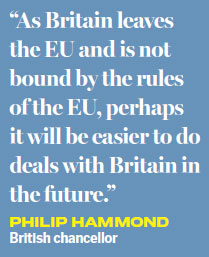FTA could be a post-Brexit boon
Updated: 2016-08-05 08:11
By Cecily Liu(China Daily Europe)
|
|||||||||
Britain's departure from EU could lead to improved trade and investment ties with China
Britain could enjoy closer trade and investment relations with China through a potential free trade agreement after the country leaves the European Union, analysts say.
Such a deal between the world's second-largest and fifth-largest economies could change the dynamics of global trade, and would be significant as negotiations on a China-EU FTA have stalled.
Experts say a China-UK deal would benefit the British economy, although it could take years to finalize as a lot depends on the Brexit negotiations.
If Britain maintains common trade tariff borders with the EU, for example, it cannot reduce tariffs for Chinese exports, although it can still act as a springboard for Chinese companies to enter European markets.
Philip Hammond, the British chancellor, expressed eagerness for a China FTA during a visit to Chengdu, Sichuan province, for the G20 finance ministers meeting last month. "As Britain leaves the EU and is not bound by the rules of the EU, perhaps it will be easier to do deals with Britain in the future," Hammond told the BBC.
Michael Reiss, a senior associate with law firm King & Wood Mallesons, says Britain's banking and insurance sector, and healthcare, education and legal sectors can all benefit from such an FTA.
China can benefit from a greater ability to invest in Britain's high-tech, energy, advanced manufacturing and services industries, he says, adding that such investment is already possible, but it may move quicker with policy support from an FTA.

Aline Doussin, a partner at law firm Squire Patton Boggs who specializes in international trade, says enhanced trade relations from an FTA could lead to Britain reinforcing China's efforts to be recognized as a market economy. London is already a supporter, and Beijing maintains the status is an automatic part of its World Trade Organization accession 15 years ago.
Another opportunity for China would be to use Britain as a springboard to access EU markets, the same way China uses Switzerland, which has a bilateral agreement for tariff-free exports to the EU, she adds.
However, the Swiss-EU agreement allows for the free movement of people, and as immigration was a key reason many voted for Brexit in the June 23 referendum, Britain is unlikely to achieve a similar deal with the EU.
China has implemented 14 FTAs with other countries, and another 19 are in negotiation. The FTA with Switzerland is frequently cited as a model for a potential UK deal, as Switzerland is part of Europe but not an EU member.
The Sino-Swiss FTA, implemented in 2014, grants zero tariffs on 99.7 percent of Chinese exports to Switzerland and 84.2 percent of Swiss exports to China. The deal also includes agreements to cooperate on environmental issues, labor and employment, and intellectual property protection.
Tomas Casas, director of the University of St. Gallen's China Competence Center, says the Swiss deal demonstrates that "a bit less Europe, much more global" approach can pay off.
"The Sino-Swiss FTA is important because China is not included in US-led trade negotiations like the Trans-Pacific Partnership and Transatlantic Trade and Investment Partnership, so it needs to develop free trade deals on its own," he says. "Switzerland is a very good partner to try out such an arrangement because it's small and flexible, yet also innovative, European and rich."
Casas believes Britain can even secure a better deal, gaining more advantageous terms for its financial services companies in China, like Australia managed with its China FTA, which was implemented last year.
Beyond economic benefits, a UK-China FTA also could help restore market confidence in Britain, according to Danae Kyriakopoulou, managing economist at the Centre for Economics and Business Research, a think tank.
"It would provide a counterview to the pessimism that has clouded the UK outlook after (the Brexit vote) by sending a signal that the UK is still open for business," she says.
And as Britain is keen to sign an FTA, the deal would probably be drafted with preferential terms for China, she adds. "While still providing a positive-sum outcome for both economies, my expectation is that China would get more out of it. This in turn would send a signal to other European economies that they have to work hard to attract China's attention."
China and the EU are in talks on an FTA, but progress is being hampered by the reluctance of some members to recognize China as a market economy. EU regulators are also threatening to impose duties on Chinese solar panels and telecommunication equipment exports.
The impact a China-UK deal would have on negotiations with the EU is unclear, Reiss says. A deal could show the benefits of an FTA and speed up the discussions, but as Britain is a key country in pushing forward a China-EU FTA, its departure from the bloc could see the deal lose momentum.
Bilateral trade in goods between China and the EU reached $564.85 billion last year, while trade between China and Britain was worth $78.54 billion, according to China's General Administration of Customs.
cecily.liu@chinadaily.com.cn
( China Daily European Weekly 08/05/2016 page26)
Today's Top News
Chinese investment in European football
Myanmar's Suu Kyi to visit Beijing
Ukraine denies attempted troop invasion of Crimea
Solidarity called to firefighters facing wildfires
Eurostar train staff to strike for seven days: UK union
Trump's gun rights comments ignite firestorm
China consumer prices up 1.8% in July
Video introduces G20 city Hangzhou to Europe
Hot Topics
Lunar probe , China growth forecasts, Emission rules get tougher, China seen through 'colored lens', International board,
Editor's Picks

|

|

|

|

|

|







